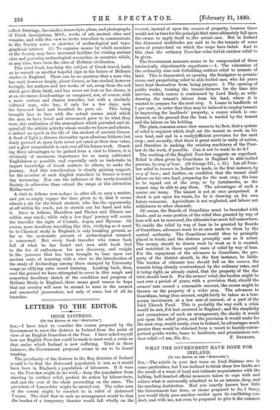LETTERS TO THE EDITOR.
IRISH DISTRESS.
[TO THE EDITOR OF THE "SPECTATOR."]
Sta,—I have tried to consider the course proposed by the Government to meet the distress in Ireland from the point of view of an English Guardian of the Poor. I have asked myself how our English Poor-law could be made to meet such a crisis as that under which Ireland is now suffering. Tried in these balances, the Government proposal seems to me to be found wanting.
The peculiarity of the distress in the Bog districts of Ireland is said to be that the distressed population is not, as it would have been in England, a population of labourers. If it were so, the Poor-law might do its work,—keep the population from starving by outdoor relief, protect its action by labour-tests, and cast the cost of the whole proceeding on the rates. The precedent of Lancashire might be carried out. The wider area of the county might be resorted to in relief of distressed Unions. The chief flaw in such an arrangement would be that the burden of a temporary disaster would fall wholly on the tenants, instead of upon the owners of property, because there would not be time for the principle that rates ultimately fall upon the owner to apply itself to ;the actual case. But in Ireland the distressed multitudes are said to be the tenants of some acres of potato-land on which the crops have failed. And to this class the ordinary Poor-law rules forbid outdoor relief to be given.
The Government measure seems to be compounded of three intrinsically objectionable expedients :-1. The relaxation of the ordinarily wise rule forbidding outdoor relief to tenants of land. This is deprecated, as opening the floodgates to promis: cnous and pauperising relief to able-bodied men who for years have kept themselves from being paupers. 2. The opening of public works, turning the tenant-farmers for the time into navvies, which course is condemned by Lord Emly, as with- drawing the tenant's labour from his land, where it is wanted to prepare for the next crop. 3. Loans to landlords at 1 per cent., in order that they may be induced to employ tenants in improving the landlords' property, a course which is con- demned, on the ground that the loan is needed by the tenant and the labour on his holding.
The plain, common-sense view seems to be, first, that a system of relief is required which shall set the tenant to work on his own land, and end in a reallyrefficient provision for the next crop; and secondly, that there is great merit in unity of action, and therefore in making the existing machinery of the Poor- law do the work, if possible. Can it not be made to do it P The working of the English Poor-law suggests an expedient Relief is often given by Guardians in England to able-bodied persons, by way of loan. (59 George Ill., c. 12.) Let all Poor- law relief to tenants in Ireland be made, in the first instance, by way of loan; and further, on condition that the tenant shall labour on his own land, preparing for the next crop ; the loan to be repaid out of the crop, or by instalments, as the tenant may be able to pay them. The advantages of such a course are many. The tenant is not at once pauperised. A check is put upon his wants, for he is drawing on his own future resources. Agriculture is not neglected, and labour not withdrawn to other channels.
Of course, the Boards of Guardians must be furnished with funds, and as some portion of the relief thus granted by way of loan will not be recovered, the ultimate loss must fall somewhere. To enable the relief by way of loan to be granted by Boards of Guardians, advances must be at once made to them by the central authority. The Guardians would thus be promptly placed in funds, and the distress promptly met as it arises. The money should be drawn week by week as it is wanted, and restricted to these special cases of relief by way of loan. For the repayment of the advances to Guardians, the pro- perty of the district should, in the first instance, be liable. The burden of ultimate loss should fall on the owners, the tenants being already overburdened by the ordinary rates, and it being right, as already stated, that the property of the dis- trict should bear it. For the owners' relief, the burden might be cast over a period of years, with a provision that, should the owners' rate exceed a reasonable amount, the excess might be thrown on the property of a wider area. The advances to Guardians, being thus secured, might fairly be taken as a tem- porary investment, at a low rate of interest, of a part of the Irish Church Fund. This is probably the way such a crisis would be met, if it had occurred in England ; and the simplicity and promptness of such an arrangement, the checks it would put upon the relief given, and the provision it would make for the next crop, would surely, even in Ireland, be advantages much greater than would be obtained from a resort to hastily-extem- porised public works, loans to landlords, and promiscuous out-


































 Previous page
Previous page